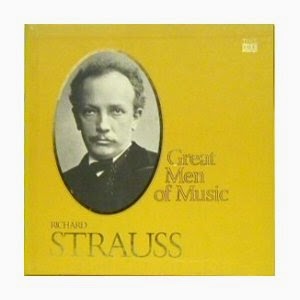On my Leonard Pennario web log today I bragged about scoring a whole bunch of Time Life Great Men of Music at Amvets. What a haul!
Is there anything more irresistible than a big pile of classical records you do not really need? It was like Christmas. I did not want to come up to bed because I was sitting on the couch with Mahler and Strauss.
As I confided on the other web log, I love these sets for their booklets. CDs, because of their size, cannot have these luxurious booklets, with big photos to feast your eyes on, beautiful layouts that you can read comfortably while they are spread out on your lap. It fosters concentration, you know? You sit there with the booklet in your lap, or simply the record jacket in your lap, and that is where you remain, glancing at it now and then as you listen.
The Strauss record tells the story of him and his soprano wife, Pauline. It is very nicely written, by someone named Robert Jones. Did he go to Bob Jones University? Wherever he went it speaks well for their writing program, unless he is like me and just writes what comes out of his head.
Anyway, he writes about how Pauline would harangue Strauss but Strauss apparently enjoyed it, took it in some kind of humor. At the end of Strauss' life:
Back in Switzerland, Strauss battled kidney infections and coped with Pauline, whose fits and rages made them unwelcome in one hotel after another. Finally they found sanctuary at the Palace Hotel in Montreux, the only establishment willing to tolerate this extraordinary woman. Andit was there that Ricahrd Strauss composed his last tribute to music, to the soprano voice, to Pauline, and to his own life: the Four Last Songs. Amazingly, they were equal to the greatest music he ever created.
In May 1949 Strauss returned to Garmisch, having the previous year been cleared by a court in Munich of any taint of collaboration with the Nazis. Seriously ill, he was put to bed, suffering from a kidney stone that at his age was inoperable. Before he sank into his final coma he quoted a line from "Tristan": "Greet all the world for me." And to Alice Strauss, his daughter-in-law, he observed, "Dying is just as I composed it in 'Death and Transfiguration.'"
Richard Strauss died peacefully in his sleep on the afternoon of Sept. 9, 1949. He was 85. At his cremation three days later the trio from "Der Rosenkavalier" was sung.
Pauline Strauss -- that strange woman with the voice that haunted the pages of her husband's music, that termagant whom nobody but Richard Strauss understood -- lived for less than nine months after his death. At 87, on May 13, 1950, Pauline followed her faithful Richard into eternity -- in a towering rage, one likes to think, at having been kept waiting.
Beautiful.
It is funny, whenever anyone preaches to us about composers and their muses no one ever mentions Strauss and his wife. I had no idea she was that bad, you know? I mean, to be run out of hotels! But how interesting. All you hear about his Robert and Clara Schumann. I want to hear about Richard and Pauline Strauss. This booklet said he wrote that passionate song "Cacilie" the night before their wedding. To have a song like that ....
... written about you!! Wouldn't you die??
Hahaha... that pianist is scrambling ... but we get to hear Jussi Bjoerling. That high note at the end!! Have you ever heard anyone hold it that long? The guy is like a steam engine. Maestro, you go!
Where was I?
Oh yes. Anyway this is why I buy these box sets.
I will post other things I discover.
We're Going In! The Junior League's Decorators' Show House
-
The 2025 Decorators' Show House. Photo by the Author.
Yesterday I got to go and see the Junior League Decorators' Show House.
I’ve just published a new s...
8 months ago












No comments:
Post a Comment